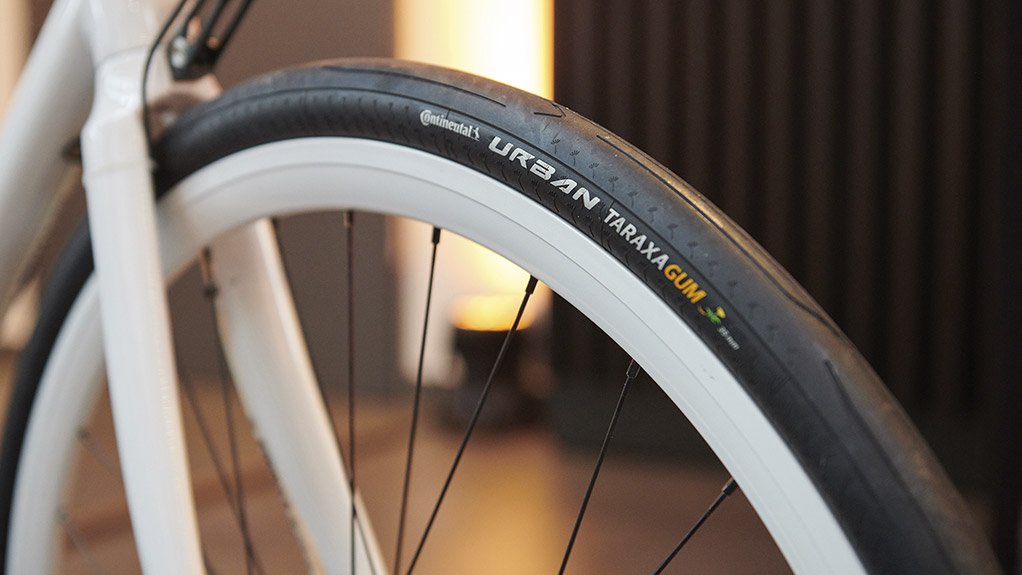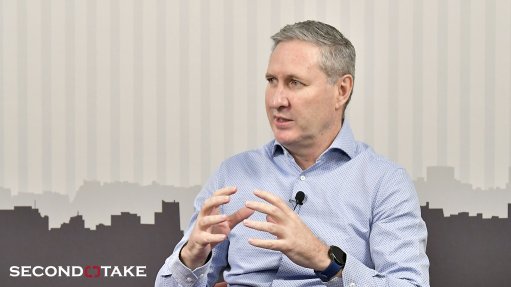Continental Tires bundles sustainability activities in new department
This article has been supplied as a media statement and is not written by Creamer Media. It may be available only for a limited time on this website.
For many years, Continental’s Tire business area has demonstrated an ongoing commitment to the area of sustainability and has now bundled all activities and projects in a newly created department under the leadership of Claus Petschick as part of its “Vision 2030” strategy program.
As Head of Sustainability, Petschick is responsible for the strategic direction and worldwide steering of all sustainability projects, and in this role reports directly to Christian Kötz, Head of the Tire business area and Member of the Executive Board of Continental AG.
Claus Petschick has worked at Continental for over 30 years, initially holding various positions in R&D and product development for the original equipment (OE) business before assuming the management of the tyre plant in Hanover-Stöcken in 2007. Most recently, the 58-year-old construction engineer was responsible for global quality assurance within the tyre sector as Vice President Quality Management for over ten years.
"With the creation of a dedicated sustainability organization under the leadership of Claus Petschick, we are consolidating our far-reaching activities and research projects and underscoring our commitment to further systematic expansion of sustainable business models and innovative products and services along the entire value chain,” explains Christian Kötz, Head of the Tires business area and member of the Executive Board of Continental AG. “We are confident that sustainable and responsible management enhances our capacity for innovation and our future viability, and that we can make an important contribution to society and toward shaping our future through our commitment.”
Sustainable and responsible management has been an integral part of Continental’s corporate strategy and development for many years. The focus of the sustainability strategy is on the four strategic topics of climate change mitigation, clean mobility, circular economies, and sustainable supply chains. In order to make the tyres of the future even more energy-efficient and environmentally friendly in terms of production, use and recyclability, Continental is systematically investing in the research and development of new technologies, alternative materials, and environmentally compatible production processes.
This includes, for example, the extension of product service life through retreading. Back in 2013, Continental already built the globally unique ContiLifeCycle plant in Hanover, Germany, for this purpose. Here, specially designed machine fleets with integrated retreading systems set new standards in the field of tyre recycling.
A further central concern for Continental is to cease importing natural rubber exclusively from the tropics, but to produce it as close as possible to the tyre plants in order to prevent the ongoing deforestation and reduce the CO2 emissions generated through long transport routes. In future, the multiple award-winning, long-term Taraxagum project from Continental and the Fraunhofer Institute for Molecular Biology and Applied Ecology (IME) will supply natural rubber from dandelion plants, which can be used for producing motorcycle, car and commercial vehicle tyres. The Urban Taraxagum bicycle tyre is Continental’s first series-produced tyre manufactured using natural rubber from the dandelion plant.
Continental is committed to sustainability in the natural rubber supply chain and is striving to provide the greatest possible transparency and to establishing a traceable and sustainable supply chain via an electronic system. Continental is also a founding member of the Global Platform for Sustainable Natural Rubber (GPSNR), an association of the major players in the natural rubber sector from business and civil society, who are working jointly to improve global sustainability in the natural rubber sector.
Q&A with Claus Petschick
With the Tour de France 2020 still fresh in our minds and environmental protection a key element of the race, Claus Petschick, Head of the Sustainability department at Continental’s Tires business area, explains the company’s approach to this event, its broader sustainability initiatives, and how cycle racers might soon be lining up on tyres produced using dandelion.
Mr. Petschick, sustainability is an important factor for the Tour de France organizers. For example, they promote eco zones along the course and encourage trash separation during the race. What can Continental, as a partner of the Tour, do to help make this a sustainable event?
Claus: Continental is a champion of sustainability, most prominently in its role as a partner of the Tour de France. The Tires business area has been engaged in sustainability-related initiatives for many years. We recently brought together all our activities and projects into the newly created Sustainability department as part of our strategy program “Vision 2030”. This move allows us to target our worldwide sustainability-related activities and research projects even more effectively.
A key contributor here is our partnership with the GPSNR (Global Platform for Sustainable Natural Rubber) and the company GIZ (Deutsche Gesellschaft für Internationale Zusammenarbeit), through which we are seeking to establish a verifiably sustainable pathway for sourcing natural rubber. Here, our aim is to put in place a traceable and sustainable supply chain and lead by example by establishing best practices in natural rubber production. To this end, we are conducting basic research in many areas with the goal of developing alternative raw material sources for tyre production.
Can you give us an example?
Claus: About two years ago, Continental opened a new research lab in the German region of Mecklenburg-Vorpommern. The teams at the Taraxagum Lab work with experts from the Fraunhofer Institute on extracting natural rubber from dandelion plants. Locating rubber plantations next to the tyre factory would then bring both ecological and economic benefits; short transportation distances would significantly reduce CO2 emissions. This would also allow us to address the environmental problem of increasing deforestation and the associated conversion of forest areas to other forms of land use.
Does this mean cycle racers might be using dandelion-based tyres in the future?
Claus: Some cyclists already are! With the Urban Taraxagum, we have brought the world’s first bike tyre with a tread made from dandelion rubber onto the market. And where did we present it? At last year’s Tour de France, of course. The pro racers aren’t using them quite yet, but there is strong demand among urban cyclists for these extremely effective and, yes, sustainable tyres. Extending their usage span beyond the city limits remains an option for the future.
Will cars soon be fitted with these tyres as well?
Claus: Small-series production of the bicycle tyres takes place at our plant in Korbach, Germany. We haven’t quite reached the same stage yet when it comes to large-scale use on cars. But we are working hard on driving forward the industrialization of dandelion-based tyres. We expect to have the first series-produced tyres for passenger cars ready in the next five to ten years. We have already tested some very promising experimental tyres at our Contidrom facility near Hanover and at Arvidsjaur in Sweden. However, a lot of time-intensive development work is required to create a versatile-usage, high-performance product of excellent quality for customers.
Dandelion is for sure not the only magic ingredient in the tyres...
Claus: No, but it is a particularly exciting one. It goes without saying that we are working in a number of different areas to constantly increase the sustainability of our production processes and products – in line with the strategy I mentioned earlier. To this end, all the materials in a tyre are tested repeatedly and, as far as possible, replaced with more environment-friendly alternatives. For example, we have developed a special tyre for hybrid vehicles whose rolling resistance is around 30 percent lower than that of a standard tyre. The vehicle therefore has to use its combustion engine for propulsion far less frequently and it covers greater distances on electric power.
So rolling resistance is key to more sustainable mobility?
Claus: That’s right. In addition to safety, minimizing rolling resistance is one of our principal aims in the research and development process; it means fuel and electric power consumption can be cut substantially. So if the support cars in future editions of the Tour de France are all hybrids or electric, we will have the right tyre ready for them.
Comments
Announcements
What's On
Subscribe to improve your user experience...
Option 1 (equivalent of R125 a month):
Receive a weekly copy of Creamer Media's Engineering News & Mining Weekly magazine
(print copy for those in South Africa and e-magazine for those outside of South Africa)
Receive daily email newsletters
Access to full search results
Access archive of magazine back copies
Access to Projects in Progress
Access to ONE Research Report of your choice in PDF format
Option 2 (equivalent of R375 a month):
All benefits from Option 1
PLUS
Access to Creamer Media's Research Channel Africa for ALL Research Reports, in PDF format, on various industrial and mining sectors
including Electricity; Water; Energy Transition; Hydrogen; Roads, Rail and Ports; Coal; Gold; Platinum; Battery Metals; etc.
Already a subscriber?
Forgotten your password?
Receive weekly copy of Creamer Media's Engineering News & Mining Weekly magazine (print copy for those in South Africa and e-magazine for those outside of South Africa)
➕
Recieve daily email newsletters
➕
Access to full search results
➕
Access archive of magazine back copies
➕
Access to Projects in Progress
➕
Access to ONE Research Report of your choice in PDF format
RESEARCH CHANNEL AFRICA
R4500 (equivalent of R375 a month)
SUBSCRIBEAll benefits from Option 1
➕
Access to Creamer Media's Research Channel Africa for ALL Research Reports on various industrial and mining sectors, in PDF format, including on:
Electricity
➕
Water
➕
Energy Transition
➕
Hydrogen
➕
Roads, Rail and Ports
➕
Coal
➕
Gold
➕
Platinum
➕
Battery Metals
➕
etc.
Receive all benefits from Option 1 or Option 2 delivered to numerous people at your company
➕
Multiple User names and Passwords for simultaneous log-ins
➕
Intranet integration access to all in your organisation



















